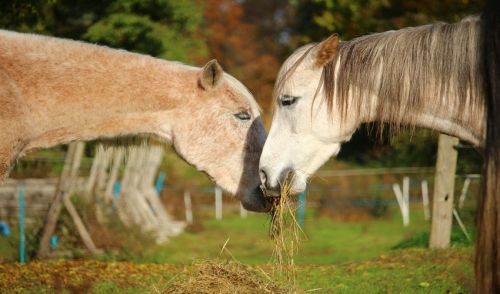
Nutrition Tips for Your Senior Horse
Just like humans, horses will begin to show signs of deterioration as they reach their senior years. We typically define a “senior” horse as one about fifteen to eighteen years old, although you may notice these changes well outside of this age bracket. Our first and most important tip is to remain highly sensitive to your pet’s needs as he or she gets older, as basic care, including medical attention, shelter, and diet become increasingly important in keeping your horse alive and comfortable.
With regard to diet, you will need to watch for several signs that your horse’s food regimen needs changing. Just like an older man’s potbelly, you may notice your horse gain weight as his metabolism slows. Combat weight gain with higher quality feed designed for senior horses. Good hay will cost more, but neglecting to feed your horse high quality foods can result in steep medical bills on the other end. One potential risk is that of laminitis, which is often associated with obesity in horses.
Even more troubling amongst aging horses, however, is weight loss. Dramatic decreases in weight can be the first sign of a significant internal problem, so be sure to consult your vet should this be the case. You may also notice your horse start to “quid” in conjunction with her weight loss; due to dental soreness your horse will form a bolus of food in her mouth and spit out these “quids” after only a few bites. A vet will be able to tackle this problem initially by “floating” the teeth, or filing down the sharp bits that are causing irritation.
However, you can make several changes in diet to ease your horse’s mouth pains as well. If your horse is unable to keep on weight by grazing out in pasture, you will need to start supplementing his diet. A pellet diet softened by water can often be the best solution—come to us for feeds specifically designed for senior horses. These feeds range widely in content, but you can expect to find, among other things, increases in protein to maintain muscle quality, increased fat content to make up for lost calories, and even yeast cultures to help with digestion. These sorts of feeds are often designed as soft pellets or cubes that are easily chewable, however, if dental loss or soreness is so extreme, you may want to mash these cubes down further or make a floating “cereal” in a bowl of lukewarm water to ease consumption.
We also recommend vegetable oil as an additive to any senior horse’s diet. These oils are high in calorie count, but are easy to digest due to their liquid form. One or two cups a day will also bring back luster to your horse’s coat, which may have become dull or bristly over the years. As with all of these changes in diet, the key to introducing a new ingredient is to do it slowly. As you add supplements, oils or change the composition of feed, make sure to test each variable at a time, taking note of how your horse’s condition changes. This way, you will know which ingredients are helping or hurting the situation, as opposed to altering the diet all at once. Finding the perfect combination for your horse will take some time, but having your pal around for twenty or even thirty years is well worth the patience!
